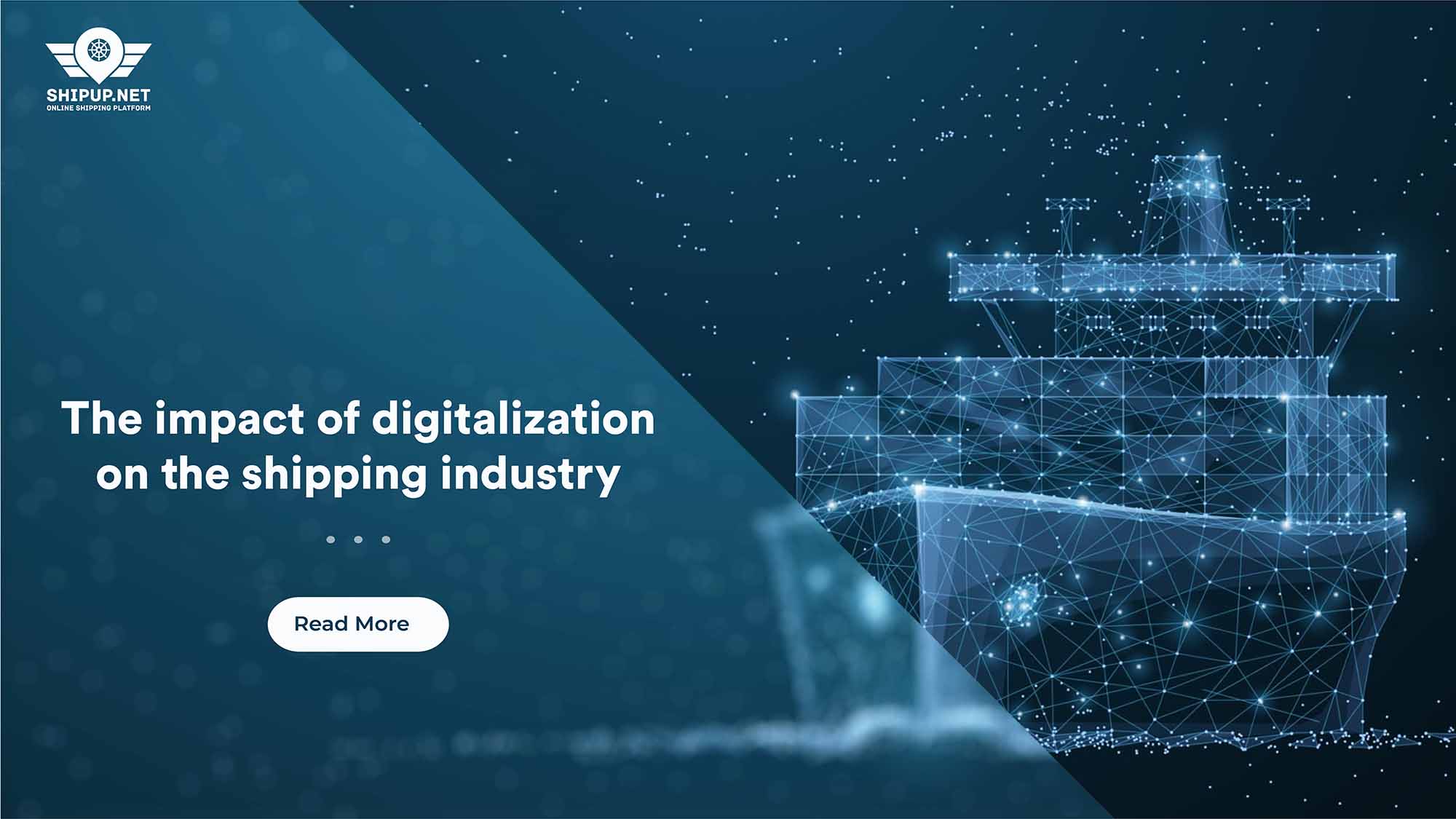The shipping industry has come a long way since its inception. From the days of sailing ships and manual labor, the industry has evolved into a highly automated and globalized system. After many years of experiencing and growing, here is the time to see new movements in this Industry.
Digitalization is one of the most significant driving forces behind this transformation. Covid-19 showed us the weak points and we all learned that the shipping operations have yet to be efficient and digitalization is the key.
But what exactly is digitalization? Simply put, it’s the integration of digital technologies into all areas of a business. This integration usually leads to profound changes in the way work is done in all the sections. In this article, we’ll dive into the impact of digitalization on the shipping industry and what it means for importers, exporters, and freight forwarders.
Digitization in the Shipping Industry: Then and Now
The shipping industry has a rich history dating back thousands of years. From the Phoenician merchants to the Spanish Armada, the shipping industry has always been at the forefront of human progress. Still, our lives completely depend on the process of shipping goods all around the world.
Fast forward to the present day, and the shipping industry has grown into a massive global network that connects people and businesses from all over the world. The industry is responsible for transporting everything from consumer goods to raw materials, and it plays a critical role in the global economy. Just have a look at your breakfast table, all the things you bring to your table have been shipped from one place to another and then to another and another…
Who Gets Digitized in Shipping Industry?
The shipping industry is a complex system that involves multiple players and stakeholders. At the center of it all are the shipping companies that own and operate the vessels. They work closely with freight forwarders, who act as intermediaries between shippers and carriers, and importers and exporters, who rely on the shipping industry to move their goods around the world.
The shipping industry is also closely monitored by governments and international organizations, who set the rules and regulations that govern the industry. These regulations play a crucial role in ensuring the safe and efficient operation of the industry.
Overview of Digitalization and its impact on the Shipping Industry
In recent years, digital technologies have had a profound impact on the shipping industry. From vessel tracking systems to digital freight forwarders, digitalization has changed the way the industry operates.
One of the key digital technologies affecting the shipping industry is the Internet of Things (IoT). IoT devices, such as sensors and GPS tracking devices, allow for real-time monitoring of vessels and cargo, providing shipping companies with valuable insights into their operations.
Another key technology is cloud computing, which enables shipping companies to store and analyze large amounts of data in real-time. This data can then be used to make informed decisions, improve operational efficiency, and reduce costs. Digitalization is having a major impact on the shipping industry, changing the way the industry operates and creating new opportunities for growth. Here are some of the key impacts of digitalization:
Increased Efficiency and Cost Savings
One of the biggest benefits of digitalization is increased efficiency and cost savings. Digital technologies, such as IoT and cloud computing, allow shipping companies to automate many processes and reduce manual labor. This leads to faster and more efficient operations, which can result in significant cost savings.
Improved Tracking and Visibility
Digitalization also leads to improved tracking and visibility in the shipping industry. With real-time vessel and cargo tracking, shipping companies can have a clear view of their operations at all times. This improves decision-making and helps to avoid costly delays and disruptions.
Enhanced Customer Experience
Digitalization also has the potential to enhance the customer experience in the shipping industry. Digital freight forwarders, for example, allow customers to track their shipments in real-time and make informed decisions about their supply chain. This leads to a more seamless and efficient customer experience.
Increased Transparency and Collaboration
Digitalization is also leading to increased transparency and collaboration in the shipping industry. With digital technologies, shipping companies can share information and collaborate more easily. This leads to improved decision-making and a more seamless supply chain.
For example, blockchain technology can be used to create a shared database of information that all parties in the supply chain can access. This leads to increased transparency, as all parties have a clear view of the supply chain, and reduces the risk of fraud and errors.
Disruptive Effects and Challenges for Traditional Players
While digitalization is bringing many benefits to the shipping industry, it’s also leading to disruptive effects and challenges for traditional players. As new digital technologies emerge, traditional players may struggle to keep up and may be at risk of losing market share to new, more agile competitors.
One of the biggest challenges is the need for investment in digital technologies. Shipping companies must invest in digital technologies to remain competitive, but this requires significant resources and expertise. This can be a major challenge for smaller shipping companies, who may struggle to keep up with the rapid pace of technological change.
Another challenge is the need for new skills and expertise. As digital technologies become more integrated into the shipping industry, there is a growing need for professionals with digital skills. This can be a major challenge for traditional players, who may struggle to find and retain the right talent.
Visiwise Moves the Global Business Forward
Digitalization is rapidly transforming the shipping industry, and Visiwise is at the forefront of this revolution. We have always tried to emerge as a game-changer with our innovative platform that brings much-needed visibility to shipment management operations. Visiwise has a user-friendly interface that enables companies of all sizes to manage and track their shipments with ease, providing valuable insights into their operations.
One of the biggest advantages of Visiwise’s platform is its ability to integrate with famous ERP or TMS systems like SAP, Odoo, and others. Right now, thousand of shipment are being tracked in different companies around the globe and they are using the integrated Visiwise. This integration provides a seamless flow of information between internal systems and the Visiwise platform, enabling companies to streamline their operations and boost efficiency. By using Visiwise, businesses can now have full visibility into their supply chains, enabling them to identify potential bottlenecks, take corrective measures, and reduce transit times. We call it a big and clear impact on shipping procedures.
The impact of digitalization on the shipping industry is undeniable. From enabling shippers to track their shipments in real-time to automating shipping and delivery processes, digitalization is creating new opportunities for the industry. With its innovative platform and cutting-edge technology, Visiwise is helping to move the global business forward, making it easier and more efficient for companies to operate.
The potential benefits of digitalization and the integration of platforms like Visiwise go beyond just efficiency gains. By reducing the need for manual intervention and streamlining processes, companies can also lower their carbon footprint and reduce their impact on the environment. By making the shipping process more efficient and sustainable, digitalization is driving the industry towards a greener and more sustainable future and we all need a safe and healthy environment.
As the shipping industry continues to evolve, the adoption of digital technologies like Visiwise is becoming increasingly important. The benefits of digitization, such as increased efficiency, improved visibility, and a reduced environmental impact, are driving the industry forward. With innovative companies like Visiwise leading the charge, the shipping industry is well-positioned to take advantage of the opportunities presented by digitalization.


